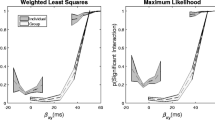Abstract
A case is presented for regarding individual differences in planful behavior as a personality trait. Cognitive planning is discussed as a unique human ability, as one of the four processes comprising planning, arousal-attention, simultaneous, and successive coding of information. After discussing its roots in neuropsychology and cognitive psychology, we present some studies that link individual differences in planning tasks to locus of control, self-concept, and intrinsic motivation. Another study also shows that the use of proper strategies in a problem-solving situation is associated with good planners. In the concluding remarks we suggest that planning is a dynamic rather than a static trait of characterizing the holistic nature of activities of every individual. Improvement of planful behavior is discussed as a possibility dependent on the social and personal history of an individual.
Similar content being viewed by others
References
ASHMAN, A. R., & DAS, J. P. (1980). Relation between planning and simultaneous-successive processing. Perceptual and Motor Skills, 51, 371–382.
BAKER-SENNETT, J., MATUSOV, E., & ROGOFF, B. (1993). Planning as developmental process. In H. W. Reese (Ed.), Advances in child development and behavior (Vol. 24. pp. 253–281). San Diego: Academic Press.
DAS, J. P. (1980). Planning: Theoretical considerations and empirical evidence. Psychological Research (W. Germany), 41, 141–151.
DAS, J. P. (1992). Beyond a unidimensional scale of merit. Intelligence, 16, 137–149.
DAS, J. P., BISANZ, G. L., & MANCINI, G. (1984). Performance of good and poor readers on cognitive tasks: Changes with development and reading competence. Journal of Learning Disabilities, 17, 549–555.
DAS, J. P., KIRBY, J. R., & JARMAN, R. F. (1979). Simultaneous and successive cognitive processes. New York: Academic Press.
DAS, J. P., & NAGLIERI, J. A. (1989). Das-Naglieri: Cognitive assessment system: Experimental test battery. Unpublished manuscript.
DAS, J. P., NAGLIERI, J. A., & KIRBY, J. R. (1994). Assessment of cognitive processes. New York: Allyn and Bacon.
DIGMAN, J. M. (1990). Personality structure: Emergence of the five-factor model. Annual Review of Psychology, 41, 417–440.
EYSENCK, H. J. (1979). The structure and measurement of intelligence. Berlin: Springer-Verlag.
GALTON, F. (1869-1962). Hereditary genius. Cleveland, OH: The World Publishing Company.
GHOLSON, B. (1980). The cognitive-developmental basis of human learning: Studies in hypothesis testing. New York: Academic Press.
GUILFORD, J. P. The nature of human intelligence. New York: McGraw Hill.
HARTER, S. (1981). A new self-report scale of intrinsic versus extrinsic orientation in the classroom: Motivational and informational components. Developmental Psychology, 7, (3), 300–312.
HILGARD, E. R. (1987). Psychology in America. San Diego: Harcourt, Brace, Jovanovich.
HUNT, D., DELACEY, P. R., & RANDHAWA, B. S. (1987). Problem solving, planning and personality. International Journal of Psychology, 22(1), 98–110.
LEVINE, M. (1975). A cognitive theory of learning: Research on hypothesis testing. New York: Wiley.
LURIA, A. R. (1966a). Higher cortical functions in man. New York: Basic Books.
LURIA, A. R. (1966b). Human brain and psychological processes. New York: Harper & Row.
LURIA, A. R. (1969a). Frontal lobe syndromes. In P. J. Vinken & G. W. Bruyn (Eds.), Handbook of clinical neurology: Localization in clinical neurology, Vol. 2. Amsterdam: North-Holland.
LURIA, A. R. (1969b). The origin and cerebral organization of man’s conscious action. Paper presented at the Xix International Congress of Psychology, London, England.
LURIA, A. R. (1970). The functional organization of the brain. Scientific American, 222, 66–78.
LURIA, A. R. (1973). The working brain: An introduction to neuropsychology. New York: Basic Books.
LURIA, A. R. (1974). Language and brain: Towards the basic problems of neurolinguistics. Brain and Language, 1, 1–14.
LURIA, A. R. (1976). Cognitive development: Its cultural and social foundations. Harvard University Press: Cambridge, MA.
LURIA, A. R. (1980). Higher cortical functions in man (2nd ed., Rev. and exp.). New York: Basic Books.
MAGNUSON, D., & TORESTAD, B. (1993). A holistic view of personality: A model revisited. Annual Review of Psychology, 44, 427–452.
MILLER, G., GALANTER, E., & PRIBRAM, K. (1960). Plans and the structure of behavior. New York: Holt.
MISCHEL, W. (1968). Personality and assessment. New York: Wiley.
MURPHY, D., & DAS, J. P. (1986). Intrinsic motivation, planning and problem solving in good and poor readers. Unpublished manuscript, University of Alberta, Edmonton, Canada.
NAGLIERI, J. A. (1989). A cognitive processing theory for the measurement of intelligence. Educational Psychologist, 24, 185–206.
NAGLIERI, J. A., & DAS, J. P. (1990). Planning, attention, simultaneous, and successive (Pass) cognitive processes, A model for intelligence. Journal of Psychoeducational Assessment, 8, 303–337.
PHILLIPS-CARMICHAEL, I. (1990). Cognitive processing ability: An examination of attention, coding and planning and their relationship to self-concept and locus of control in eight and nine year old children. Unpublished doctoral dissertation, Ohio State University.
SAPIR, S., & NITZBURG, A. (1973). Children with learning problems. New York: Brunner/Mazel.
SHALLICE, T. (1982). Specific impairments of planning. Philosophical Transactions of the Royal Society of London, 298, 199–209.
VYGOTSKY, L. S. (1962). Thought and language. Cambridge: The Mit Press.
WEINMAN, J., ELITHORN, A., & COOPER, R. (1985). Personality and problem solving: The nature of individual differences in planning, scanning and verification. Personality and Individual Differences, 6(4), 453–460.
Author information
Authors and Affiliations
Additional information
The writing of this paper was supported by a grant from Social Sciences and Humanities Research Council, Ottawa, Canada, to J.P. Das and John R. Kirby. We acknowledge the many contributions of Rauno Parrila to this paper.
Rights and permissions
About this article
Cite this article
Das, J.P., Naglieri, J.A. & Murphy, D.B. Individual Differences in Cognitive Processes of Planning: A Personality Variable?. Psychol Rec 45, 355–371 (1995). https://doi.org/10.1007/BF03395148
Published:
Issue Date:
DOI: https://doi.org/10.1007/BF03395148



